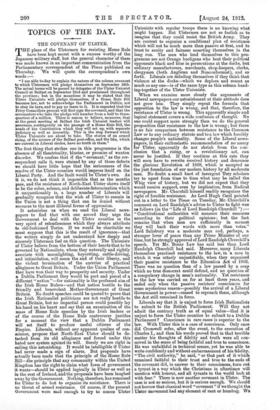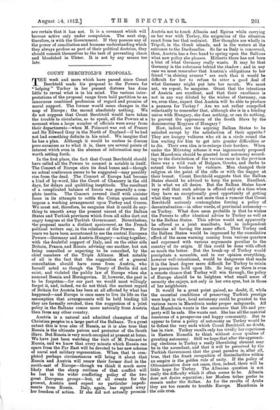TOPICS OF THE DAY.
THE COVENANT OF ULSTER.
THEplans of the Ulstermen for resisting Home Rule have been kept secret with a success worthy of the Japanese military staff, but the general character of them was made known in an important communication from the Parliamentary correspondent of the Times published on Thursday. We will quote the correspondent's own words .- " I am able to-day to explain the nature of the solemn covenant to which Ulstermen will pledge themselves on September 28th. The actual terms will be passed by delegates of the Ulster Unionist Council at Belfast on September 23rd and proclaimed throughout the province ; but in the meantime it may be stated that the Ulster Unionists will pledge themselves, if a Home Rule Bill becomes law, not to acknowledge the Parliament in Dublin, not to obey its laws, and to pay no taxes to it. It is expected that the Privy Councillors present will first sign the covenant, and that the covenanters who take the pledge will number from a half to three- quarters of a million. There'is reason to believe, moreover, that at the great meeting at Belfast the Irish Unionist leaders will announce, contingently on the passage of a Home Rule Bill, the heads of the Constitution which they will set up, with separate judiciary as well as Assembly. This is the step forward which Ulster Unionists are about to take. The stories of an armed rising, of the seizure of the Belfast post-office, and the like, which are current in Liberal circles, have no truth in them."
The first thing that strikes one in this programme is the absence of all theatricality, bluster, or promise of wanton disorder. We confess that if the " covenant," as the cor- respondent calls it, were stained by any of those defects we should have little hope that the seriousness of the resolve of the Ulster counties would impress itself on the Liberal Party. And the fault would be Ulster's own. As it is, we do not think it impossible that as the months pass, and the resistance of North-East Ulster shows itself to be the sober, solemn, and deliberate determination which it unquestionably is, a large number of Liberals will gradually recognize that the wish of Ulster to remain in the Union is not a thing that can be denied without recourse to the most illiberal forms of oppression.
It astonishes us when we read the Liberal news- papers to find that with one accord they urge the Government to deal with the Ulster counties in the very spirit of relentlessness which they always attribute to old-fashioned Tories. If we would be charitable we must suppose that this is the result of ignorance—that the writers simply do not understand how deeply and sincerely Ulstermen feel on this question. The Unionists of Ulster believe from the bottom of their hearts that to be governed by Nationalists, whom they naturally and rightly associate with moonlighting, boycotting, cattle-driving, and intimidation, will mean the end of their liberty, and the violent termination of the exercise of practical allegiance to Great Britain. Under the Union Parliament they have won their way to prosperity and security. Under a Dublin Parliament they would be part and parcel of a different " nation "—for nationality is the professed aim of the Irish Home Rulers—and that nation hostile to the friendly and benevolent Mother-Government of Great Britain. No doubt speeches could be quoted to prove that the Irish Nationalist politicians are not really hostile to Great Britain, but no impartial person could possibly lay his hand on his heart and say that an examination of the mass of Home Rule speeches by the Irish leaders or of the course of the Home Rule controversy justifies for a moment the view that a Dublin Parliament will set itself to produce useful citizens of the Empire. Liberals, without any apparent qualms of con- science, propose that North-East Ulster should be de- tached from its old allegiance and forced under this hated new system against its will. Surely we are right in calling this astonishing. It would be intelligible if Ulster had never made a sign of alarm. But proposals have actually been made that the principle of the Home Rule Bill—the principle that any community within the United Kingdom has the right to claim what form of government it wants—should be applied logically in Ulster as well as in the rest of Ireland, and the proposals have been laughed away by the Government. Nothing, therefore, has remained for Ulster to do but to organize its resistance. There is no threat of armed. resistance. Of course, if the present Government were mad enough to try to coerce Ulster Unionists with regular troops there is no knowing what might happen. But Ulstermen are not so foolish as to imagine that they could resist the British Army. They are content to organize a conditional plan of resistance which will not be much more than passive at first, and to trust to sanity and fairness asserting themselves in the long run. The men who lend themselves to this pro- gramme are not Orange hooligans who beat their political opponents black and blue in persecutions at the docks, but ordinary manufacturers, merchants, shop-keepers, clerks, clergymen (both Anglican and Nonconformist), and so forth. Liberals are deluding themselves if they think that violence at the docks—which we deplore and resent as much as any one—is of the same type as this solemn band- ing-together of the Ulster Unionists.
When we examine more closely the arguments of Liberal newspapers our astonishment at their attitude does not grow leas. They simply repeat the formula that opposition to the law is wrong, and that, therefore, the resistance of Ulster is wrong. This apparently simple and logical statement covers a wide confusion of thought. No one could support more strongly than we do the general proposition that resistance to the law is wrong ; but there is no fair comparison between resistance to the Common Law or to any ordinary statute and to a law which forcibly changes people's nationality. Some of the Liberal news papers, in their enthusiastic recommendation of no mercy for Ulster, apparently do not shrink from the con- clusion that a rising, or a revolutionary act, can never be justified. If they continue at this rate they will soon have to rewrite received history and denounce the glorious Revolution of 1688, which is accepted as the just foundation of our modern history by all moderate men. No doubt a small knot of insurgent Tory scholars try to upset from time to time what may be called the Whig view of history, but we did not expect that they would receive support, even by implication, from Radical newspapers. Mr. Churchill himself readily recognizes the right of forcible resistance. As Lord Hugh Cecil pointed out in a letter to the Times on Tuesday, Mr. Churchill's comment on Lord Randolph's advice to Ulster to fight was as follows (in the "Life of Lord Randolph Churchill ") " Constitutional authorities will measure their censures according to their political opinions ; but the fact remains that when men are sufficiently in earnest they will back their words with more than votes." Lord Salisbury was a moderate man and, perhaps, a stronger lover of peace than any Prime Minister of our time, but he strongly approved of Lord Randolph Churchill's speech. Yet Mr. Bonar Law has said less than Lord Randolph Churchill had said. Moreover, many Liberals themselves practised resistance to the law, in a case in which it was utterly unjustifiable, when they organized their passive resistance to the Education Act of 1902. There was no question then of a law passed by a' coup which no true democrat could defend, and no question of a compulsory change in men's nationality. Yet resistance to the law was carried on for at least three years, and ended only when the passive resisters' consciences for some mysterious reason—possibly the arrival of a Liberal Government in power—ceased to reproach them, although the Act still remained in force.
Liberals say that it is unjust to force Irish Nationalists to submit to the British Parliament. Will they not admit the contrary truth as of equal value—that it is unjust to force the Ulster counties to submit to a Dublin Parliament? Conscience in rare cases is superior to the law. With Ulster this is a case of conscience. Only once did Cromwell refer, after the event, to the execution of Charles L, and then his words proved that in that terrible matter his thoughts of fidelity and truth were all con- ceived in the sense of being faithful and true to conscience. He was unfaithful in technical senses, yet he was able to write confidently and without embarrassment of his fidelity. "The civil authority," he said, " or that part of it which remained faithful to their trust and true to the ends 'of the covenant did, in answer to their consciences, turn out a tyrant in a way which the Christians in aftertimes will mention with honour, and all tyrants in the world look at with fear." There is now another covenant in Ulster. The case is not so serious, but it is serious enough. We should not borrow that classical word "covenant " if we thought the Ulster movement had any element of rant or humbug. We are certain that it has not. It is a covenant which will become active only under compulsion. The next step, therefore, is with the Government. If they possess any of the power of conciliation and humane understanding which they always profess as part of their political doctrine, they should commit themselves to the task of preventing chaos and bloodshed in Ulster. It is not by any means too late.



































 Previous page
Previous page